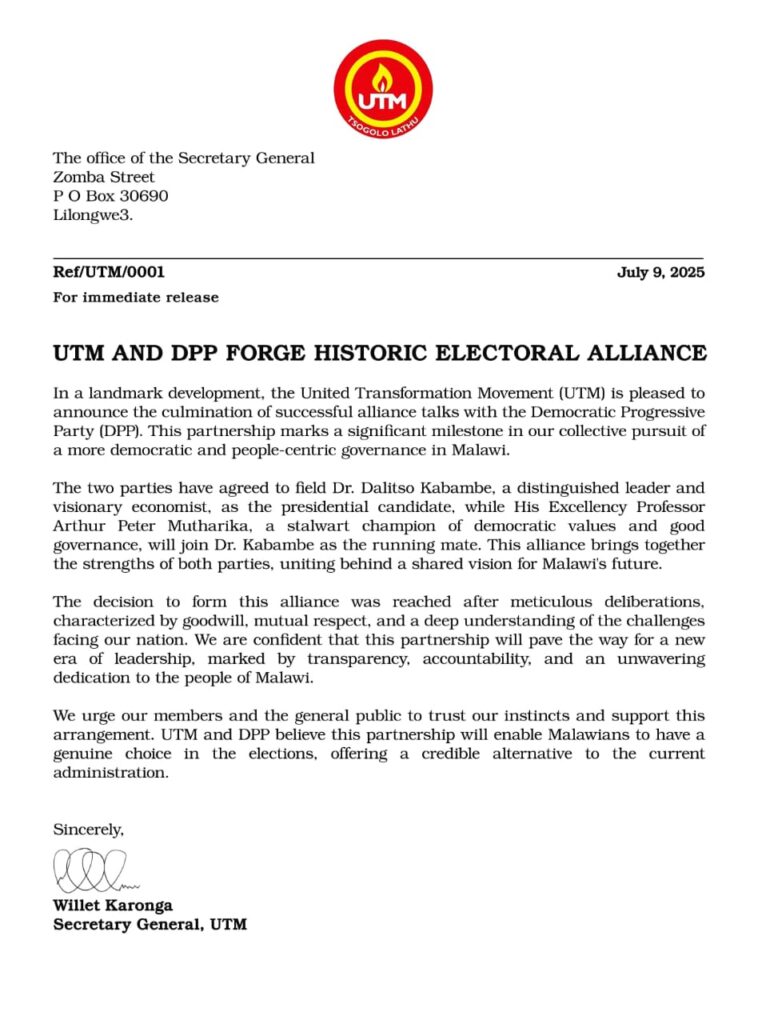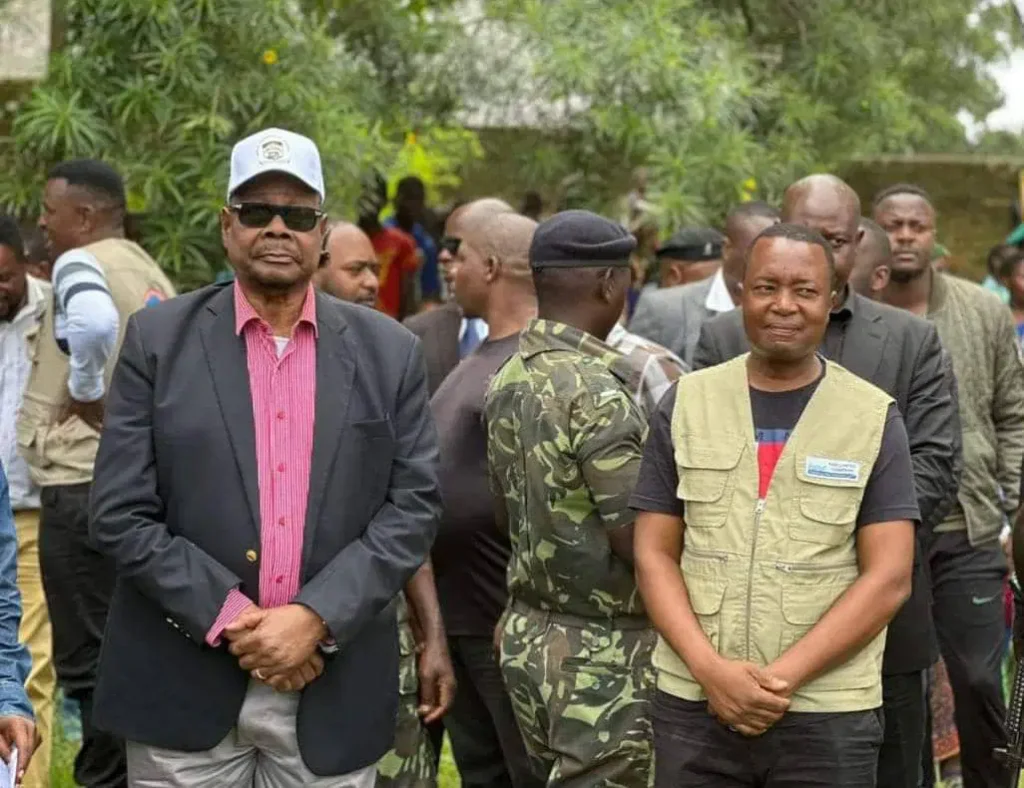In a dramatic political turn, UTM has officially entered into an electoral alliance with the Democratic Progressive Party (DPP), effectively positioning Dr. Dalitso Kabambe as presidential candidate and former president the aging Arthur Peter Mutharika as his running mate.
The alliance, formally announced on Tuesday, is already drawing intense criticism, disbelief, and accusations of betrayal and dishonesty among UTM’s loyal base.

Signed off by UTM Secretary General Willet Karonga, the statement described the alliance as a product of “goodwill, mutual respect, and deep understanding.”
However, outside the polished prose of the official communiqué, the political gamble has been described by insiders and political analysts as a bitter confirmation of long-held fears: that Kabambe, a former DPP technocrat, was strategically planted in UTM to capture it from within and drag it back into DPP’s grip.

Speculation about Kabambe’s allegiance has lingered since his sudden defection to UTM following his fallout with the DPP over leadership succession.
Critics and even some UTM loyalists whispered that Kabambe’s move was too calculated, too convenient, and lacked the ideological transformation typical of genuine political migration.
His quiet but steady rise within UTM ranks, and his absence from public criticism of DPP excesses during its rule, only deepened suspicions.
“People thought it was political paranoia when we said Kabambe was a Trojan horse. Now the mask is off. This is not an alliance, it’s a hostile takeover by the DPP in the skin of unity,” said a senior UTM official who asked for anonymity.
Kabambe’s nomination as presidential flagbearer on a DPP ticket is being seen as the final blow to UTM’s identity and a betrayal to its founder the late Vice President Dr. Saulos Klaus Chilima.
Chilima dumped the DPP and it’s the then State President Mutharika in 2018 over governance and corruption concerns, could now be watching in disbelief as his once-promising movement merge back with the same establishment he denounced.
For the DPP, the alliance is nothing short of a comeback blueprint. Following the court-sanctioned annulment of the 2019 elections and its crushing loss in the 2020 fresh polls, the party has struggled with leadership disputes and credibility issues.
With Mutharika aging and the party fragmented, the deal with UTM, and the injection of Kabambe’s technocratic image, seems to offer a temporary relief, although the once rejected former Reserve Bank Governor also seems the task to be too big for his political experience and being a novice.

Mutharika, in joining as running mate, has effectively reversed roles, a signal that the DPP is desperate for power, even if it means playing second fiddle to Kabambe who failed to deliver the economic transformation he once promised.
“This alliance exposes how little ideological commitment exists in Malawian politics. It’s about power, not principles. The same DPP that accused Chilima and his allies of betrayal is now sitting on the same table, not with Chilima, but with someone many suspect was their proxy all along,” said political analyst.
UTM was born from a rebellion, a bold move by Chilima to challenge the status quo and usher in a new brand of youth-driven, accountable governance. That vision now lies in ruins, according to supporters online and on the ground.
Across social media, UTM supporters have called the alliance “a betrayal,” “a political scam,” and “the final nail in the coffin of hope.”
One Facebook user writes: “This alliance is a spit in the face of those of us who believed in UTM’s anti-corruption message. We marched in the rain for justice. Now we’re told we’ll vote for the same system we fought to defeat?”
Analysts believe the UTM-DPP pact could weaken the opposition bloc by alienating reform-minded voters who had rallied behind Chilima’s vision.
The alliance sets the stage for a potentially three-horse race in the 2025 polls: the ruling MCP under President Lazarus Chakwera, the UTM-DPP alliance under Kabambe and Mutharika, and a possible third force from independent or disgruntled players.
“This alliance may consolidate political capital in the Southern Region. But it also opens the floodgates for a new generation of opposition, especially if those who fought the DPP out of power feel abandoned,” notes a governance expert.
Despite the pushback, the joint statement from UTM insists the partnership “offers a credible alternative to the current administration.”
It promises a government anchored in transparency and accountability, the same language Chilima once used to denounce the DPP’s rule between 2014 and 2020, marred by allegations of state capture, corruption, and economic mismanagement.
The UTM-DPP alliance might look like a strategic masterstroke on paper, but its success depends on more than just political arithmetic. It is interesting to watch how the party will navigate the tribal lenses considering that both Kabambe and Mutharika come from the same Lhomwe belt.
Again, both parties now face the challenge of uniting disillusioned supporters, managing internal dissent, and explaining how a movement that once decried DPP’s excesses can now share a manifesto with them.
Whether Kabambe will rise as a unifying national figure or be rejected as a political opportunist remains to be seen. What is clear is that the soul of UTM is at stake, and in the eyes of many, it may already be lost.








